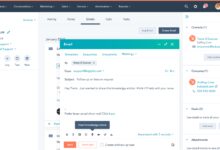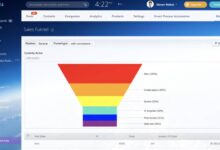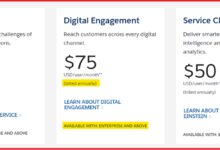Salesforce CRM Pricing: 7 Shocking Truths You Must Know in 2024
Thinking about Salesforce CRM pricing? You’re not alone. With its powerful tools and global reputation, Salesforce dominates the CRM market—but its pricing can be a maze. Let’s break it down clearly, so you can decide if it’s worth every penny.
[ez-toc]
Salesforce CRM Pricing: The Complete Breakdown for 2024

When it comes to customer relationship management (CRM), Salesforce is the gold standard. But understanding Salesforce CRM pricing isn’t as simple as picking a plan and paying a flat fee. The platform offers a tiered structure with multiple editions, add-ons, and customization options that can dramatically affect your final cost. In 2024, Salesforce continues to evolve, introducing new pricing models that reflect the growing demand for AI, automation, and cloud-based scalability.
Unlike many competitors that offer straightforward monthly subscriptions, Salesforce’s pricing is highly customizable. This flexibility is great for large enterprises but can be overwhelming for small to mid-sized businesses. The base price for Salesforce CRM starts at $25 per user per month, but with essential features often locked behind higher tiers or add-ons, the real cost can quickly escalate.
According to Salesforce’s official website, the company emphasizes value-based pricing—meaning you pay for what you use and the ROI you expect. However, this model requires careful planning and a deep understanding of your business needs to avoid overspending.
Understanding the Core CRM Editions
Salesforce offers several CRM editions, each tailored to different business sizes and needs. The main editions include:
- Salesforce Essentials: Designed for small businesses with up to 10 users. Priced at $25/user/month, it includes basic sales automation, email integration, and mobile access.
- Salesforce Professional: Aimed at growing businesses. At $80/user/month, it adds workflow automation, customizable dashboards, and support for multiple currencies.
- Salesforce Enterprise: For mid to large-sized companies. Priced at $165/user/month, it offers full customization, API access, and advanced security features.
- Salesforce Unlimited: The most robust edition at $360/user/month, including 24/7 phone support, sandbox environments, and premium consulting hours.
Each edition builds on the previous one, meaning you can’t access advanced features without upgrading. This tiered approach is central to Salesforce CRM pricing and often leads businesses to pay more than initially anticipated.
Hidden Costs in Salesforce CRM Pricing
One of the biggest criticisms of Salesforce CRM pricing is the presence of hidden or indirect costs. These include:
Implementation Fees: Setting up Salesforce often requires third-party consultants.Depending on complexity, implementation can cost anywhere from $5,000 to over $100,000.Training Costs: Employees need training to use Salesforce effectively.Salesforce offers Trailhead for free learning, but customized corporate training can cost $1,000–$5,000 per user.Add-On Modules: Features like Marketing Cloud, Service Cloud, or Einstein AI are sold separately and can double your monthly bill.
.Data Storage Fees: While base plans include standard storage, exceeding limits incurs extra charges—up to $100 per GB per month in some cases.”Salesforce doesn’t just sell software; it sells a transformation.But that transformation comes with a price tag that many underestimate.” — CRM Industry Analyst, Gartner
How Salesforce CRM Pricing Compares to Competitors
To truly understand the value of Salesforce CRM pricing, it’s essential to compare it with other leading CRM platforms.Let’s look at how Salesforce stacks up against HubSpot, Zoho CRM, and Microsoft Dynamics 365..
Salesforce vs. HubSpot CRM
HubSpot offers a free CRM with robust features, making it a favorite among startups and small businesses. Its paid plans start at $50/month for the Sales Hub Professional, which includes automation, reporting, and integrations.
While HubSpot is more affordable, it lacks the depth of customization and enterprise-grade scalability that Salesforce provides. Salesforce’s AI-powered Einstein Analytics, for example, is far more advanced than HubSpot’s reporting tools. However, for businesses that don’t need extreme customization, HubSpot offers better value.
According to G2’s 2024 comparison, Salesforce scores higher in enterprise functionality, while HubSpot wins in ease of use and affordability.
Salesforce vs. Zoho CRM
Zoho CRM is one of the most cost-effective solutions on the market. Its Standard plan starts at just $14/user/month, and even the top-tier Enterprise plan is priced at $52/user/month—less than a third of Salesforce’s Enterprise cost.
Zoho excels in automation, AI-driven insights, and integration with other Zoho apps. However, it falls short in global support, third-party integrations, and advanced analytics. For businesses operating in multiple countries or requiring deep ERP integration, Salesforce remains the superior choice despite the higher Salesforce CRM pricing.
Salesforce vs. Microsoft Dynamics 365
Microsoft Dynamics 365 is perhaps the closest competitor to Salesforce in the enterprise space. Its Sales Professional edition starts at $95/user/month, while the Enterprise edition is priced at $225/user/month—still cheaper than Salesforce’s $165 and $360 tiers.
Dynamics 365 integrates seamlessly with Microsoft 365, making it ideal for organizations already using Outlook, Teams, and Excel. However, Salesforce leads in AI capabilities, app ecosystem (AppExchange), and user adoption rates. A Forrester study from 2023 found that Salesforce users reported 27% higher sales productivity than Dynamics 365 users.
The Real Cost of Salesforce CRM: Total Cost of Ownership (TCO)
When evaluating Salesforce CRM pricing, it’s crucial to look beyond the monthly subscription fee. The Total Cost of Ownership (TCO) includes all direct and indirect expenses over a 3- to 5-year period. Let’s break down the components of TCO for a mid-sized company with 100 users.
Subscription Costs Over Time
Assuming a company opts for Salesforce Enterprise at $165/user/month, the annual subscription cost is:
- 100 users × $165 × 12 months = $198,000 per year
- Over 3 years: $594,000
- Over 5 years: $990,000
This doesn’t include annual price increases, which Salesforce typically implements at 5–7% per year. Factoring in inflation, the 5-year cost could exceed $1.1 million.
Implementation and Customization Expenses
Most companies require professional services to configure Salesforce properly. These include:
- Consulting fees: $100–$200/hour
- Average implementation time: 3–6 months
- Total implementation cost: $50,000–$200,000
Customization, such as building custom objects, workflows, or integrations with ERP systems, can add another $30,000–$100,000 over five years.
Ongoing Maintenance and Support
Even after launch, Salesforce requires continuous maintenance:
- Admin salaries: Many companies hire full-time Salesforce admins at $70,000–$100,000/year
- Annual renewals for sandboxes, data backup, and security tools: $10,000–$25,000/year
- Upgrades and feature adoption: $15,000–$50,000 every 1–2 years
When all these factors are combined, the 5-year TCO for a 100-user Salesforce deployment can easily exceed $1.5 million—more than 50% higher than the base subscription cost.
Salesforce CRM Pricing by Product Line
Salesforce doesn’t just sell one CRM—it offers a suite of cloud-based products, each with its own pricing structure. Understanding how Salesforce CRM pricing varies across product lines is key to making an informed decision.
Sales Cloud Pricing
Sales Cloud is the core CRM platform for managing leads, opportunities, and sales pipelines. Its pricing tiers are:
- Essentials: $25/user/month – Basic contact and deal management
- Professional: $80/user/month – Includes forecasting, email integration, and workflow rules
- Enterprise: $165/user/month – Full customization and API access
- Unlimited: $360/user/month – Premium support and sandbox environments
For more details, visit the official Sales Cloud pricing page.
Service Cloud Pricing
Service Cloud is designed for customer service teams. It starts at $75/user/month for the Digital Edition and goes up to $300/user/month for the Unlimited Edition. Key features include case management, knowledge base, and omnichannel support.
Many businesses are surprised to learn that Service Cloud is a separate purchase from Sales Cloud. If you need both, you’ll pay for each edition individually—effectively doubling your per-user cost unless you negotiate a bundled deal.
Marketing Cloud Pricing
Marketing Cloud is Salesforce’s digital marketing platform, used for email campaigns, social media, and customer journey mapping. Unlike other clouds, it doesn’t have a fixed per-user price. Instead, it’s priced based on:
- Number of contacts in your database
- Email send volume
- Use of advanced features like Journey Builder or Einstein Recommendations
Entry-level Marketing Cloud plans start around $1,250/month, but enterprise deployments can cost $50,000+ per month. This makes Salesforce CRM pricing for marketing teams highly variable and often unpredictable.
How to Reduce Salesforce CRM Pricing Costs
While Salesforce is expensive, there are proven strategies to reduce your overall spend without sacrificing functionality.
Negotiate Your Contract
Salesforce rarely offers discounts publicly, but they are negotiable—especially for annual or multi-year commitments. Companies that commit to 3-year contracts often receive 10–20% discounts. Additionally, Salesforce may offer free training credits or extended sandboxes as part of the deal.
Tip: Always involve a procurement specialist or third-party consultant during negotiations. They understand Salesforce’s pricing levers and can help secure better terms.
Optimize User Licenses
One of the biggest cost drivers is over-licensing. Many companies assign full Salesforce licenses to users who only need read-only access. Instead, consider using:
- Lightning Platform Starter: $25/user/month for basic app access
- Customer Community Licenses: As low as $7/user/month for external users
- Chatter Free: Free for employees who only need collaboration features
By right-sizing licenses, companies can reduce their Salesforce CRM pricing by 30–50%.
Leverage Free Tools and Trailhead
Salesforce offers a wealth of free resources:
- Trailhead: Free online learning platform with certifications
- AppExchange: Thousands of free or low-cost apps to extend functionality
- Developer Edition: Free sandbox environment for testing and training
Using these tools reduces dependency on paid consultants and training programs.
Salesforce CRM Pricing for Small Businesses
Many small businesses assume Salesforce is out of their league—but that’s not entirely true. With the right approach, even startups can leverage Salesforce CRM pricing effectively.
Salesforce Essentials: Is It Worth It?
Salesforce Essentials is specifically designed for small teams. At $25/user/month, it includes:
- Contact and lead management
- Email integration with Gmail and Outlook
- Mobile app access
- Basic reporting
While limited in customization, Essentials is a solid entry point. However, it lacks workflow automation and API access—features many growing businesses need within a year.
Alternatives for Budget-Conscious Startups
If Salesforce Essentials still feels too expensive, consider:
- HubSpot CRM Free: Completely free with excellent sales tools
- Zoho CRM Free: Free for up to 3 users
- Insightly: $29/user/month with strong project management features
These platforms offer similar core functionality at a fraction of the cost, making them ideal for bootstrapped startups.
Future Trends in Salesforce CRM Pricing
The CRM landscape is evolving, and Salesforce is adapting its pricing model to stay competitive.
Shift Toward Usage-Based Pricing
In 2024, Salesforce began testing usage-based pricing for certain AI and analytics features. Instead of charging per user, they charge based on the number of AI predictions, API calls, or data processed. This model benefits companies with fluctuating workloads but introduces billing unpredictability.
Increased Focus on Bundled Suites
Salesforce is pushing bundled offerings like Customer 360, which integrates Sales, Service, Marketing, and Commerce Clouds into a single package. While these bundles offer convenience, they often come at a premium and may include features you don’t need.
AI and Automation Driving Price Increases
As Salesforce integrates more AI through Einstein, expect pricing to reflect the value of automation. Features like predictive lead scoring, chatbot routing, and sentiment analysis are becoming standard—but they’re also becoming cost drivers. Companies must weigh the ROI of AI against the rising Salesforce CRM pricing.
Is Salesforce CRM pricing worth it? For enterprises that need scalability, global support, and deep integration, the answer is often yes. For small businesses, the value proposition is less clear.
How can I get a custom quote? Visit Salesforce’s official demo page to speak with a representative and get a tailored quote based on your business size and needs.
Are there any free trials available? Yes, Salesforce offers a 30-day free trial for most of its clouds. You can sign up directly on their website without a credit card.
Can I switch plans later? Absolutely. Salesforce allows you to upgrade or downgrade your plan at any time, though downgrading may require data migration.
What happens if I exceed my data storage limit? You’ll be charged overage fees, typically $100 per GB per month. To avoid this, monitor your storage usage and consider archiving old data.
In conclusion, Salesforce CRM pricing is complex but manageable with the right strategy. While it’s one of the most expensive CRMs on the market, its power, scalability, and ecosystem justify the cost for many organizations. The key is to understand your needs, negotiate wisely, and avoid unnecessary add-ons. Whether you’re a startup or a global enterprise, a clear understanding of Salesforce’s pricing structure will help you make a smarter investment.
Further Reading:



